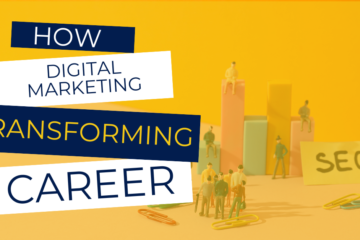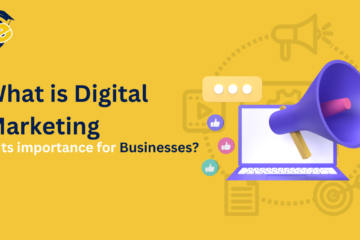
Career Opportunities in Scope of Digital Marketing for New Students
The rapid growth of digital technologies has revolutionized marketing and created a wealth of career opportunities. Scope of Digital Marketing offers diverse paths for students and professionals looking to build their careers in a dynamic, ever-evolving field. As more businesses shift their focus to digital channels, the demand for skilled digital marketers continues to increase. Below, we’ll explore the career opportunities in digital marketing and the scope for new students entering this exciting industry.
Demand for Digital Marketing Professionals
Digital marketing is a fast-growing industry, with businesses of all sizes and across various sectors relying heavily on digital strategies to reach their target audience. This trend is only expected to increase, creating a high demand for digital marketing professionals. According to a report by the Digital Marketing Institute, the global digital marketing workforce is expected to grow by 10-15% annually, further highlighting the vast career prospects in this field.
Key Roles in Digital Marketing
For students interested in pursuing a career in digital marketing, there are several roles they can explore. These roles vary depending on skill sets, interests, and career goals. Here are some of the key positions available:
1.1 SEO Specialist
An SEO specialist focuses on optimizing websites and content to rank higher on search engine results pages (SERPs). This role involves understanding search engine algorithms, conducting keyword research, improving site structure, and implementing on-page and off-page SEO strategies. SEO is one of the most in-demand skills in the digital marketing field, with companies constantly seeking experts to enhance their visibility online.
Required Skills:
- Keyword research and analysis
- On-page and off-page SEO
- Technical SEO
- SEO tools (Google Analytics, SEMrush, Moz)
- Content optimization
1.2 Content Marketer
Content marketing is a central pillar of digital marketing strategies. A content marketer creates valuable, engaging, and informative content that attracts and retains an audience. This role can involve writing blog posts, creating videos, infographics, and even social media posts. Content marketing helps businesses build their brand authority and drive organic traffic.
Required Skills:
- Strong writing and storytelling abilities
- Content strategy development
- SEO knowledge for content
- Social media management
- Analytics and performance tracking
1.3 Social Media Manager
A social media manager is responsible for managing a company’s social media platforms, such as Facebook, Instagram, Twitter, LinkedIn, and TikTok. This role involves creating and scheduling posts, engaging with followers, running paid ad campaigns, and measuring the performance of social media strategies. Social media marketing is crucial for building brand awareness and maintaining strong customer relationships.
Required Skills:
- Social media strategy and content creation
- Understanding of social media algorithms
- Analytics tools (Facebook Insights, Instagram Analytics, Hootsuite)
- Creative and visual design skills
- Communication and customer service skills
1.4 PPC Specialist (Pay-Per-Click)
PPC specialists manage paid advertising campaigns, particularly those on Google Ads, Facebook Ads, and other digital platforms. They work to optimize ad campaigns, set budgets, and improve the return on investment (ROI) for paid marketing efforts. This role requires a strong understanding of keywords, bidding strategies, and audience targeting.
Required Skills:
- Google Ads, Bing Ads, Facebook Ads management
- Keyword research and bidding strategies
- A/B testing and campaign optimization
- Analytical mindset for measuring ROI
- Budget management
1.5 Email Marketing Specialist
Email marketing is one of the most effective digital marketing scope of digital marketing & strategies for nurturing leads and retaining customers. An email marketing specialist designs and executes email campaigns, writes compelling email copy, and segments email lists for better targeting. This role is vital for building and maintaining customer relationships over time.
Required Skills:
- Email marketing platforms (Mailchimp, HubSpot)
- List segmentation and targeting
- Copywriting and persuasive messaging
- A/B testing for subject lines and content
- Analytics for campaign performance
1.6 Affiliate Marketing Manager
Affiliate marketing allows businesses to partner with third-party influencers or websites to drive traffic or sales in exchange for a commission. An affiliate marketing manager oversees partnerships, tracks performance, and ensures that campaigns generate profitable results. This role requires both digital marketing and relationship management skills.
Required Skills:
- Affiliate marketing platforms (ShareASale, Rakuten, CJ Affiliate)
- Negotiation and partnership management
- Performance tracking and analysis
- Understanding of online sales funnels
- Communication and collaboration
1.7 Digital Marketing Analyst
A digital marketing analyst is responsible for measuring and analyzing data from various marketing campaigns to evaluate their success and identify areas for improvement. This role requires strong analytical skills and an understanding of data analytics tools to track metrics like website traffic, conversion rates, and customer behavior.
Required Skills:
- Google Analytics and other data analytics tools
- Data interpretation and reporting
- A/B testing and optimization
- Knowledge of KPIs and marketing metrics
- Strong problem-solving abilities
What is Digital Marketing & its importance
Scope of Digital Marketing for New Students
2.1 Job Market Growth
As the digital world continues to expand, businesses are allocating more of their budget toward online marketing. According to Statista, global spending on digital advertising is projected to surpass $700 billion by 2025. With this increase in investment comes an increase in the demand for skilled professionals who can execute effective digital marketing strategies.
Digital marketing is a versatile industry, offering opportunities in a wide variety of sectors, such as e-commerce, technology, healthcare, education, entertainment, and finance. Students can work for agencies, in-house marketing teams, or even as freelancers, offering flexibility in career choices.
2.2 Freelance and Entrepreneurial Opportunities
One of the most attractive aspects of digital marketing is the flexibility it offers. Students who enter the field can work as freelancers or start their own digital marketing agency. With the rise of remote work, students can create a successful career without being tied to a specific geographic location.
Freelancers in digital marketing can offer services such as SEO consulting, social media management, content writing, and email marketing. Entrepreneurs can also build digital marketing startups that specialize in areas like web design, online advertising, or branding.
2.3 Growing Industry Specializations
As digital marketing continues to evolve, new niches and specializations emerge. Students entering the field can focus on specific areas of digital marketing, such as voice search optimization, artificial intelligence (AI) in marketing, influencer marketing, or video marketing. This focus allows them to become experts in a particular domain and offer specialized services.
For instance, the growth of platforms like TikTok and Instagram has led to the rise of influencer marketing, where businesses hire influencers to promote their products. Students who specialize in this niche can work with influencers, agencies, and brands to create impactful campaigns.
2.4 Continuous Learning and Innovation
The digital marketing landscape is constantly evolving with new trends, tools, and technologies. For students, this means that there will always be room for growth, learning, and innovation. Whether it’s through mastering new social media platforms, learning about emerging AI technologies, or adopting the latest SEO techniques, there will always be new challenges and opportunities in the field.
Many digital marketing professionals continue to upskill through certifications (such as Google Analytics, HubSpot, or Facebook Blueprint) and keep themselves updated with the latest industry developments by attending webinars, online courses, and workshops.
2.5 High Earning Potential
The earning potential for digital marketers is significant, with salaries varying based on role, experience, and location. According to Glassdoor, the average salary for a digital marketing manager in the United States is around $70,000 to $90,000 per year. Specialized roles like SEO specialists, content marketers, and PPC managers often earn even more as they gain experience and expertise.
Freelancers and entrepreneurs have the ability to scale their income based on their client base and the services they provide, creating even greater financial opportunities in the digital marketing sector.
Conclusion
Digital marketing presents an exciting career path with a wealth of opportunities for new students. As businesses continue to embrace online strategies, the demand for skilled digital marketing professionals will only grow. From SEO specialists and social media managers to content creators and analysts, the field offers diverse roles that cater to different interests and skill sets.
For students, entering the world of digital marketing can lead to fulfilling and lucrative career opportunities. With continuous learning, adaptability, and a passion for digital innovation, aspiring marketers can build long-lasting careers in this dynamic industry.
Frequently Asked Questions (FAQs) About Digital Marketing
To provide additional clarity and insights, here are some common questions related to digital marketing, its career opportunities, and future scope:
1. What is the future scope of digital marketing?
The future of digital marketing looks extremely promising. As businesses continue to rely on digital channels to engage with customers, the scope of digital marketing will only expand. With the rise of new technologies such as artificial intelligence (AI), machine learning, and automation, digital marketing will become even more efficient and personalized. Industries like e-commerce, healthcare, and finance will particularly see massive growth in digital marketing activities. Additionally, new trends such as voice search optimization, augmented reality (AR) ads, and influencer marketing will create fresh opportunities for digital marketers.
2. What qualifications do I need to start a career in digital marketing?
You don’t necessarily need a formal degree to start a career in digital marketing, but having a basic understanding of marketing principles and the digital landscape is essential. Many professionals begin their journey by completing certifications from platforms like Google (Google Ads, Analytics), HubSpot, or Facebook Blueprint. Additionally, knowledge in areas like SEO, content marketing, social media, and analytics will be beneficial. A background in communications, business, or graphic design can be helpful, but hands-on experience and a passion for digital marketing are often more important.
3. Can I pursue digital marketing as a part-time career?
Yes, digital marketing is an ideal field for part-time work. Many digital marketing jobs, particularly in social media management, content writing, and SEO, offer flexible schedules and freelance opportunities. Freelancers and part-time digital marketers can work from anywhere and choose projects that align with their skills and interests. Moreover, digital marketing has a low barrier to entry, so even if you have other commitments, you can start learning and gradually take on projects as a side hustle.
4. How much can I earn as a digital marketer?
The earning potential for digital marketers varies based on factors such as job role, experience, and location. For instance:
- Entry-level positions like social media managers or content writers typically earn around $40,000 to $60,000 annually.
- Mid-level roles, such as SEO specialists, PPC managers, or content strategists, can earn between $60,000 to $90,000 per year.
- Senior-level roles like digital marketing managers or marketing directors may earn $100,000 or more annually. Freelancers have the potential to earn more based on the number of clients they work with and the types of services they offer. Additionally, digital marketers working in specialized areas like AI-driven marketing or data analytics can command higher salaries.
5. What skills are required to be successful in digital marketing?
Some of the most important skills for digital marketers include:
- SEO (Search Engine Optimization): Understanding how to optimize websites and content for search engines.
- Content Creation and Strategy: Ability to create high-quality content that engages and educates audiences.
- Social Media Management: Proficiency in managing and strategizing on various social media platforms.
- Data Analysis and Metrics: Ability to analyze data from digital campaigns using tools like Google Analytics to measure performance and optimize strategies.
- PPC Advertising: Knowledge of paid advertising models, especially through platforms like Google Ads and social media ads.
- Email Marketing: Understanding how to create and manage email campaigns to nurture leads and retain customers.
- Creativity and Communication: Strong writing, design, and storytelling skills are essential for crafting compelling digital marketing messages.
6. How long does it take to learn digital marketing?
The time it takes to learn digital marketing depends on your learning approach and the depth of knowledge you want to acquire. If you dedicate time to learning through online courses, practical experience, and certifications, you can gain a foundational understanding within 3 to 6 months. However, becoming highly proficient in digital marketing, particularly in specialized areas like SEO or data analytics, may take 1 to 2 years of hands-on experience. Continuous learning is crucial in digital marketing, as the industry is constantly evolving with new tools and trends.
7. Is digital marketing a good career choice?
Yes, digital marketing is an excellent career choice, especially in today’s technology-driven world. The demand for digital marketing professionals is high and continues to grow as more businesses move online. It offers diverse career opportunities across different industries and provides flexibility in terms of freelance work, full-time positions, or even starting your own digital marketing agency. Additionally, digital marketing allows you to work creatively, analyze data, and stay updated with the latest trends, making it a dynamic and rewarding career choice.
8. Can digital marketing be done from anywhere?
Yes, one of the key advantages of digital marketing is the flexibility to work remotely. As long as you have an internet connection and access to the necessary tools, digital marketing work can be done from anywhere in the world. This makes it an appealing career option for those looking for work-life balance or those who want to start a digital marketing business from home. Many digital marketing professionals work remotely as freelancers or in-house employees for companies with global teams.
9. Do I need to be tech-savvy to pursue digital marketing?
While being tech-savvy can be an advantage in digital marketing, you don’t need to be an expert in technology to get started. A basic understanding of how the internet works, using social media platforms, and familiarizing yourself with digital marketing tools like Google Analytics or WordPress can be enough. As you gain experience, you will naturally become more comfortable with the tech side of digital marketing. Moreover, there are plenty of resources and training programs available to help you improve your technical skills as you go.
10. What are the challenges in a career in digital marketing?
While digital marketing offers numerous opportunities, it also comes with its challenges:
- Constant Change: The digital marketing landscape is constantly evolving, with new trends, tools, and algorithms. This means digital marketers need to be adaptable and continue learning throughout their careers.
- High Competition: With the growing demand for digital marketing professionals, the competition for top roles can be intense.
- Pressure for Results: Digital marketers are often under pressure to deliver measurable results, such as increased website traffic, conversions, or sales. This requires a data-driven approach and the ability to optimize strategies in real-time.
11. What industries are hiring digital marketers?
Digital marketing professionals are in demand across virtually all industries, including:
- E-commerce: Online retail businesses use digital marketing to drive sales and customer engagement.
- Healthcare: Hospitals, clinics, and health-related services use digital marketing to educate patients and promote services.
- Education: Educational institutions use digital marketing to reach potential students and promote courses.
- Entertainment: The film, music, and gaming industries utilize digital marketing to build audiences and promote content.
- Technology: Tech companies leverage digital marketing to promote new products and services.
- Financial Services: Banks, insurance companies, and fintech companies use digital marketing to acquire and retain customers.




[…] is growing, especially as more businesses realize the importance of digital strategies. Hence, Scope of Digital Marketing for new digital marketing students is also […]